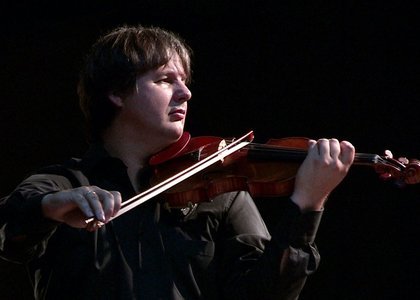> [Archived] Interviews

Liviu Prunaru - Soloist of the National Radio Orchestra
Soloist, concertmaster of one of the world's greatest orchestras, professor... we're talking about a hell of a schedule. Does anything change the moment you return to Romania?
Well, yes and no. It depends on what I return with, on where I perform, on whom I perform with. Usually, yes, things do calm down to a certain degree; I mean I feel better at home, more relaxed, than among foreigners. It will always be like this. But, music-wise, I can't really say it's peaceful or quiet. The chaos goes on, only in a different way.
Is this serenity also accompanied by additional excitement, taking into account the fact that you're standing in front of the Romanian audience?
There will always be excitement. That we meet familiar people... just makes it a bit bigger. When I look around the hall and see the faces of childhood friends or teachers, it grows again. That's why it's a good idea not to look around before the concert. But always - and I notice this at every concert and during every trip I make - contact with the public is unpredictable from multiple points of view and on different levels. Why? Because you can never know what sort of relationship will originate at that moment, you can never know how the public will receive that which you have to offer, you can't foresee the reaction or... even if you, as a soloist, are capable of building that bridge, that relationship with the public, a bridge through which feelings flow, are communicated between hall and stage; many times that happened, but there were also concerts when I left the stage unsatisfied, although technically and musically everything went as planned, but I look for that magic that I want to feel at every concert and I always fight for it, but it's not always up to me. This is a realm that is quite mystical, quite unknown ... this psychology of sending energies, and feelings and thoughts. I'm in a bit of an observational stage, of experimentation, of research of this phenomenon. In the life of every soloist, you first go through technique, then you evolve musically as well, but I am now at a stage where I'm very interested in this communication; in fact, the essence of going on stage. Why do we do this? Why do we go on stage and do what we do? And I'm trying to give this a meaning.
You're proposing a Paganini concert. In your point of view, how is his history?
It's a pretty tinted history. I've never felt good enough to hold a Paganini concert or a Paganini composition. Even so, in every international competition I participated I was forced to play and always interpret Paganini's Caprices. And, at a certain point, after I had gained a bit of confidence that I could tackle more complicated things with, I was about 24 or 25 years old, I believe, I decided to hold a Paganini concert. But, as I don't enjoy taking travelled roads and playing Concert no. 1, as they usually do, I started with the second, that famous Campanella that I have always adored, because it is a little different from the others. It is a lot more harmonious, a lot more melancholic, it's in a lower key that immediately leads you to reflection, introspection and meditation and I felt very, very mesmerized by this concert. I interpreted it in those years, when I was a student, and played it only once - in Athens, in 1995. 20 years have passed since this concert was last performed. Meanwhile, of course, I have played and learned many others. Now here I am, returning to this first love of mine - dangerous, I have to admit, and I am very curious as to how it will turn out. Just as with the public, there is that curiosity regarding the outcome, especially for someone that is not specialized in this virtuosity concerts that some wrongly, in my opinion, consider to be lacking musical substance... I find it a superb concert in terms of musicality and construction. It is very well written for the violin as well. These last days, I've been thinking about the moods instilled by this concert and I have to tell you, I rarely entered this deep meditative stage that this concert put me in, because, technical difficulties aside, you need to find that rhythm and break free from this technical vortex that draws you in. You need to break free and when you sing a technical piece, you must still make the audience aware of how harmonious, of how beautiful it is.
Translated by Bucur Adrian and Elena Daniela Radu
MTTLC, the University of Bucharest














